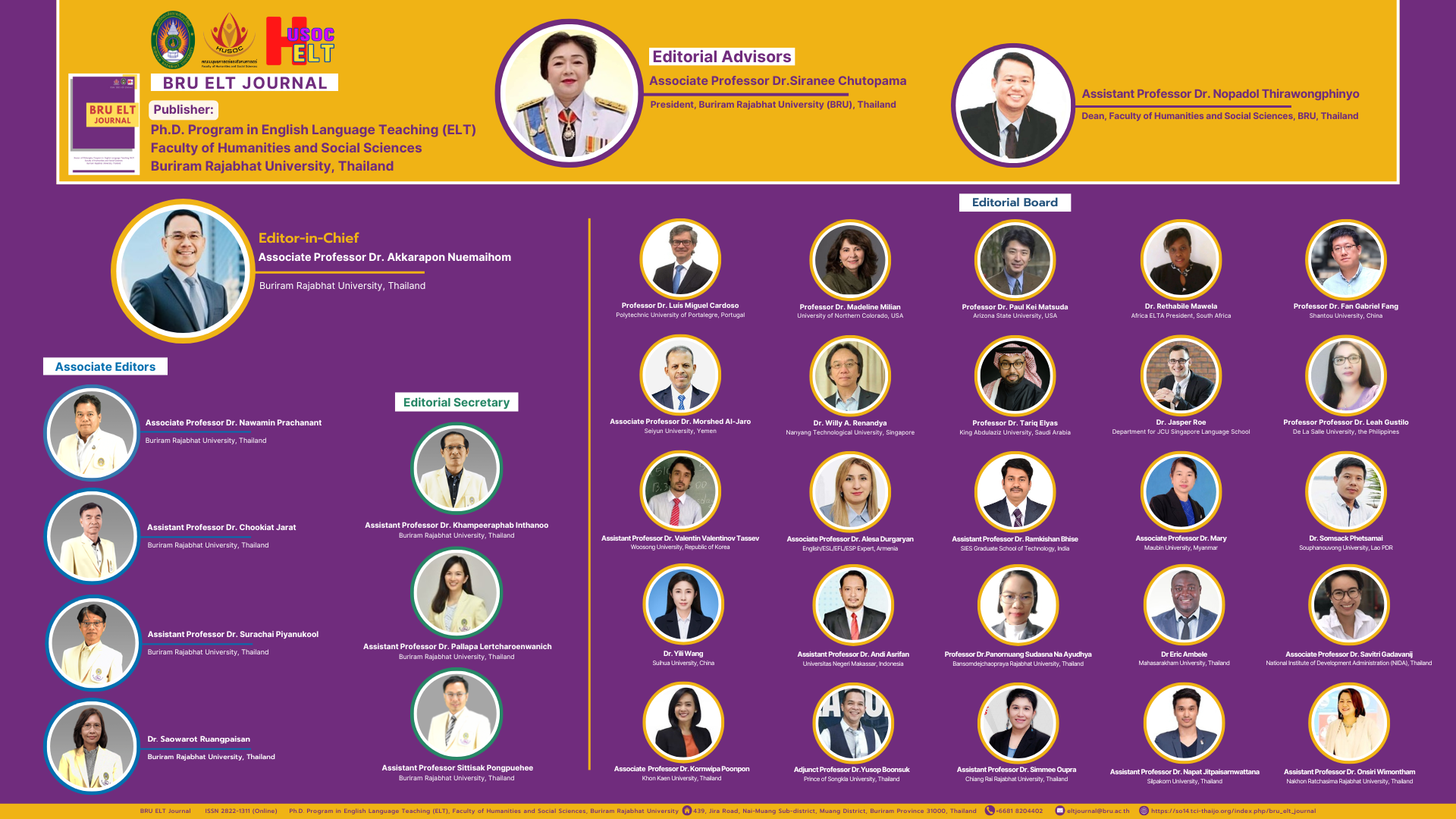Teaching Speaking Skills through Self-Learning Modules: A Case of a School in a Hinterland
DOI:
https://doi.org/10.14456/bej.2023.9Keywords:
self-learning modules, adaptability, resiliency, modularAbstract
Teaching speaking skills during pandemic times seemed challenging not only for the learners but also among the teachers. This study explored the experiences of junior high school teachers in a hinterland school who taught speaking skills through the use of Self-Learning Modules (SLM). The case study identified six language educators who were purposefully chosen based on the following criteria: they are licensed language educators; they are currently teaching in the Department of Education, and they have expressed willingness to participate in the study. To understand their experiences, a Qualitative Case Study research design was employed. In-depth interviews were conducted to gather the data. The responses were analyzed through Braun and Victoria Clarke’s six-phase approach to coding and theme development. From the responses of the participants, three themes emerged namely: teachers as collaborators of the educational process, teachers experiencing complexities of teaching speaking skills, and teachers’ developmental strategies. These themes reflect the complex situation of teaching speaking skills among teachers in a hinterland school. Facilitating learning in speaking skills during the pandemic is a confluence of challenges and job fulfillment. Further empirical investigation may be conducted to verify the findings in other hinterland schools.
References
Al Mamun, M. A., Lawrie, G., & Wright, T. (2020). Instructional design of scaffolded learning modules for self-directed and inquiry-based learning environments. Computers & Education, 144, 103695.
Barth, R. (1997). The principal learner: A work in progress. Cambridge, MA: Network of Principals’ Centers, Harvard Graduate School of Education.
Bashir, M., Azeem, M., & Dogar, A. H. (2011). Factor effecting students’ English speaking skills. British Journal of Arts and Social Sciences, 2(1), 34-50.
Bernard, H.R. (2002). Research methods in anthropology: Qualitative and quantitative approaches (3rd ed.) Alta Mira Press.
Bogdan, R. C., & Biklen, S.K. (2003). Qualitative research for education: An introduction to theories and methods (4th ed.). Pearson Education Group.
Chandler, A. (2016). 3 tips for teaching speaking and listening skills. AMLE Magazine, 3(7), 32-35. https://www.proquest.com/tradejournals/3-tips-teaching-speaking-listeningskills/docview/1773936531/se-2?accountid=31223
Creswell, J.W. (2013). Qualitative inquiry and research design: Choosing among five approaches (3rd ed.). Sage Publications.
Coupland, N. (2007). Style Language Variation and Identity. New York: Cambridge University Press.
Cubillo, M. C. C. (2016). Dysarthria and teaching speaking skills in english as a foreign language: A case study. Miscelánea, 53, 17-45,135-136. https://www.proquest.com/scholarly-journals/dysarthriateaching-speaking-skills-english-as/docview/1860847340/se-2
Funa, A., & Talaue, F. (2021). Constructivist learning amid the COVID-19 pandemic: Investigating students’ perceptions of biology self-learning modules. International Journal of Learning, Teaching and Educational Research, 20(3), 250-264.
Giorgi, A. (2009). The descriptive phenomenological method in psychology: A modified Husserlian approach. Duquesne University Press.
Giorgi, A., Giorgi, B., & Morley, J. (2017). The descriptive phenomenological psychological method. In C. Willig & W. Rogers (Eds.). The Sage Handbook of qualitative research in psychology (pp. 176 – 192). doi:10.4135/9781526405555.
Grow, G. O. (1991). Teaching learners to be self-directed: A stage approach. Adult Education Quarterly, 41. 125-149.
Grow, G. O. (1994). In defense of the staged self-directed learning model. Adult Education Quarterly, 44. 109-114.
Guglielmino, L.M. (2013). The case for promoting self-directed learning in formal educational institutions. SA-Educ Journal, 10, 1-18.
Guest, G., MacQueen, K. M., & Namey, E. E. (2012). Applied thematic analysis. Sage.
Hallman, H.L. (2017). "Section Introduction to Part I", Innovations in English Language Arts Teacher Education (Advances in Research on Teaching, Vol. 27), Emerald Group Publishing Limited, Bingley, pp. 3-4. doi org.library.xu.edu.ph/10.1108/S1479-368720170000027012
Haili, S., Rahman, N., & Razak, R. (2018). Traditional versus virtual learning: How engaged are the students in learning English literature, Indonesian Journal of Applied Linguistics. https://doi:10.17509/ijal.v8il.11467.
Hammersly, M. (2007). The issue of quality in qualitative research. International Journal of Research & Method in Education. 30, 287-305. https://dx.doi.org/10.1080/17437270701614782.
Hsu, L., & Hsieh, S. (2011). Effects of a blended learning module on self-reported learning performances in baccalaureate nursing students. Journal of Advanced Nursing, 67(11), 2435. https://doi.org/10.1111/j.13652648.2011.05684.x
Krashen, S. (2005). Explorations in language acquisition and use: The Taipei lectures. Heinemann.
Knowles, M. (1975). Self-directed learning: A guide for learners and teachers. Association Press.
Knowles, M., Holton, E., III, & Swanson, R. (1998). The adult learner (5th ed.). Gulf Publishing.
Lincoln, Y. S., & Guba, E. G. (2000). Paradigmatic controversies, contradictions, and emerging confluences. In N. K. Denzin & Y. S. Lincoln (eds.). The handbook of qualitative research (2nd ed.). 163-188. Sage.
L. Pasternak, D., Caughlan, S., Hallman, H.L., Renzi, L., & Rush, L. (2017), Preparing English teachers for today’s context: Researching effective practice through methods courses, innovations in English language arts teacher education (Advances in Research on Teaching, Vol. 27), Emerald Group Publishing Limited, Bingley, pp. 27-39. https://doi- org.library.xu.edu.ph/10.1108/S1479-368720170000027002
Lumettu, A., & Runtuwene, T. L. (2018). Developing the students’ english speaking ability through impromptu speaking method. Journal of Physics: Conference Series, 953(1) https://doi.org/10.1088/17426596/953/1/012035
Marquez, L., Olivar, M., Brijuega, C., Ombao, R., Cerio, W., & Baes, F. (2020). Education and COVID-19: experiences and insights from a developing country, 40(1), 84-90. ACCESS: Contemporary Issues in Education. https://doi.org/10.46786/ac20.5188
McKenzie, C., Macaluso, M., & Macaluso, K. (2017). Finding footholds in a construction zone: Navigating the discourses of English language arts with pre-service teachers in the 21st century, Innovations in English Language Arts Teacher Education (Advances in Research on Teaching, Vol. 27), Emerald Group Publishing Limited, Bingley, pp. 5-26. https://doi.org.library.xu.edu.ph/10.1108/S1479-368720170000027001
Merriam, S.B., Caffarella, R.S., & Baumgartner, L.M. (2007). Learning in adulthood: A comprehensive guide. (3rd ed.). San Francisco, CA: John Wiley & Sons, Inc.
McLeod, Saul. (2015). Jean Piaget. https://www.simplypsychology.org/piaget.html. Date Retrieved: December 12, 2016.
McLeod, Saul. (2019). Constructivism as a theory for teaching and learning. Simply Psychology. https://www.psychology.org/constructivism.html.
Mishra, L., Gupta, T., & Shree, A. (2020). Online teaching-learning in higher education during lockdown period of COVID-19 pandemic, 1. International Journal of Educational Research. https://doi.org/10.1016/j.ijedro.2020.100012.
Moon, K., & Blackman, D. (2014). A guide to understanding social science research for natural scientists. Conservation Biology, 28. 1167–1177. https://dx.doi.org/10.1111/cobi.12326.
Mudra, H. (2016). Enhancing students' speaking skill through task-based language teaching (TBLT) at English tadris department of STAIN kerinci. Al-Ta'Lim Journal, 23(1), 78-89. https://doi.org/10.15548/jt.v23i1.175
Nadrag, L., & Buzarna-Tihenea (Galbeaza, A. (2017). Cooperative teaching vs. traditional teaching in developing ESP speaking skills. an experimental study. Scientific Bulletin "Mircea Cel Batran" Naval Academy, 20(2), 105-113. https://doi.org/10.21279/1454-864X-17-I2-021
Nackoney, C. (2012). Living on both sides of the fence: A phenomenological study of human resource development professionals as downsizing survivors and strategic human resource development facilitators. FIU Electronic Theses and Dissertations. https://digitalcommons.fiu.edu/etd/753.
Oradee, T. (2012). Developing speaking skills using three communicative activities (discussion, problem-solving, and role-playing). International Journal of Social Science and Humanity, 2(6), 533.
Padgett, D. K. (2008). Qualitative methods in social work research. Sage.
Pasaribu, T. A., & Dewi, N. (2021). Indonesian EFL students’ voices on online learning during COVID-19 through appraisal analysis. LEARN Journal: Language Education and Acquisition Research Network, 14(1).
Patton, M.Q. (2015). Qualitative research and evaluation methods: Integrating theory and practice (4th ed.). Sage.
Poole, G. (2012). The culturally sculpted self in self-directed learning. Medical Education, 46(8), 735–737
Raman, Y. (2017). Implementations versus reality: EFL teachers' beliefs about teaching speaking skills in state secondary schools. International Journal of Economic Perspectives, 11(1), 773-781. https://www.proquest.com/scholarly-journals/implementations-versusreality-efl-teachers/docview/1964554543/se-2?accountid=31223
Rao, P. S. (2019). The importance of speaking skills in English classrooms. Alford Council of International English & Literature Journal (ACIELJ), 2(2), 6-18.
Rojas, M. A., & Villafuerte, J. (2018). The influence of implementing role-play as educational technique on EFL speaking development. Theory and Practice in Language Studies, 8(7), 726-732. https://doi.org/10.17507/tpls.0807.02
Rotas, E., & Cahapay, M. (2020). Difficulties in remote learning: Voices of Philippine University students in the wake of covid-19 crisis, 15(2), Asian Journal of distance Education.
Ryan, R. M., & Deci, E. L. (2000). Intrinsic and extrinsic motivation: Classic definition and new directions. Contemporary Educational Psychology, 25, 24-67.
Santoso, H. B., Lawanto, O., Becker, K., Fang, N., & Reeve, E. M. (2014). High and low computer self-efficacy groups and their learning behavior from self regulated learning perspective while engaged in interactive learning modules. Journal of Pre-College Engineering Education Research, 4(2). https://doi.org/10.7771/2157-9288.1093
Schunk, D.H., & Zimmerman, BJ. (Eds) (2012). Motivation and self-regulated learning: Theory, research, and applications. Routledge.
Stake, R. E. (1995). The art of case study research. Sage.
Stake R. E. (2015). Qualitative case studies. In Denzin N. K., Lincoln Y. S. (Eds.), The Sage handbook of qualitative research (3rd ed.). 443-466. Sage.
Subagia, I. W. (2020). Roles model of teachers in facilitating students learning viewed from constructivist theories of learning. Journal of Physics: Conference Series,1503(1). https://doi.org/10.1088/17426596/1503/1/012051
Sun, Q., & Yang, Z. (2022). ‘We lose a lot of value’: Feedback on english for academic purposes speaking skills in online teaching in a UK-china jointventure university. Assessment and Evaluation in Higher Education, 47(4), 622-635. https://doi.org/10.1080/02602938.2021.1940838
Sundler, A., Lindberg, E., Nilson, C., & Palmer, M. (2019). Qualitative thematic analysis based on descriptive phenomenology, 6(3), 733–739. doi:10.1002/nop2.275
Supharatypthin, D. (2014). Developing students' ability in listening and speaking English using the communicative approach of teaching. International Journal of Arts & Sciences, 7(3), 141-149. https://www.proquest.
com/scholarly-journals/developing students
Van den Berg, H. (2005). Reanalyzing qualitative interviews from different angles: The risk of decontextualization and other problems of sharing qualitative data. Qualitative Social Research, 6(1). http://nbnresolving de/urn;nbn:de0114-fqs0501305
Virginia Braun., & Victoria Clarke (2019). Reflecting on reflexive thematic analysis, Qualitative Research in Sport, Exercise and Health, 11(4) 589-597. https://doi.org/10.1080/2159676X.2019.1628806
Vygotsky, L. S. (1978). Mind in society: The development of higher psychological processes. Harvard University Press.
Wang, X. (2020). Exploration on constructing 3-dimensional teaching model in comprehensive english. Theory and Practice in Language Studies, 10(11), 1471-1477. https://doi.org/10.17507/tpls.1011.19
Witte, S., & Goering, C.Z. (2017), "Advocacy, Humanity, and Hope in the Face of an Education World Gone Wrong", Innovations in English Language Arts Teacher Education (Advances in Research on Teaching, Vol. 27), Emerald Group Publishing Limited, Bingley, pp. 41-60. https://doi.org/10.1108/S1479-368720170000027003
Yee, B.C., Mohd Nawi, A., & Abdullah, T. (2022), "Potential disruptive innovation: online learning of public speaking courses in higher education", Foresight, Vol. 24 No. 3/4, pp. 445-455. https://doi.org/10.1108/FS-01-2021-0017
Yin, R. K. (2002). Case study research: Design and methods. Sage.






